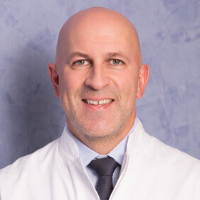
About the Department of Vascular Surgery at Brothers of Mercy Hospital Munich
The Department of Vascular Surgery at the Brothers of Mercy Hospital Munich provides the full range of modern diagnostic tests and surgical treatment of pathologies of blood vessels.The department's team of surgeons focuses on patients with carotid stenosis, abdominal aortic aneurysms, occlusive peripheral arterial disease and varicose veins. In most cases, the specialists of the medical facility manage to perform treatment with endovascular techniques. Hybrid surgical techniques can be used in complex cases. The department's surgical options are supplemented by procedures for the formation and repair of dialysis shunts, and reconstructive interventions on the blood vessels, for example, in chronic wounds or diabetic foot syndrome. Clinical practice is based on using the latest treatment methods and the high professionalism of surgeons, which in combination provides patients with the best treatment outcome. This is important for doctors to provide the patient with personalized medical care, considering their needs and wishes. The Head Physician of the department is Dr. med. Agamemnon Sotiriou.
One of the most demanded operations in the department is surgery for carotid artery stenosis, which can lead to severe complications (in particular, stroke) without timely treatment. The department's specialists offer the following operations: open thromboendarterectomy with patch angioplasty and eversion thromboendarterectomy. The essence of thromboendarterectomy is the direct removal of atherosclerotic plaques from the inner surface of the carotid artery. The final stage of the intervention is the application of a patch to the operated site of the carotid artery. When performing surgery, neuromonitoring systems and modern binocular loupes are used. An intraoperative ultrasound examination serves to assess the treatment outcomes.
An equally common pathology in the clinical practice of the medical facility is an occlusive peripheral arterial disease, characterized by stenosis or total cessation of blood flow through the arteries of the lower limbs. The pathological condition leads to multiple complications. In severe cases, limb amputation becomes the only treatment. During the diagnostic examination, the doctor must determine the grade of blood vessel stenosis/occlusion. For this purpose, the department's specialists perform angiography or magnetic resonance angiography. Therapeutic options in this area include both sparing endovascular interventions and open surgery. The most commonly performed are stent implantation and balloon dilatation. With appropriate clinical indications, the department's surgeons resort to endarterectomy with subsequent plastic reconstruction, bypass surgery and prosthetic repair. In some cases, the specialists use hybrid surgical techniques, combining endovascular and open interventions.
The department's surgical team is deservedly proud of its successful results in treating abdominal aortic aneurysms. The pathology is an abnormal enlargement of the largest blood vessel in the human body, which is accompanied by a thinning of its wall. The insidiousness of an aneurysm is that it does not cause any symptoms and is often diagnosed incidentally during the diagnostic examination for other complaints. If a patient does not receive timely treatment, the risk of aneurysm rupture and the development of severe internal bleeding, which is often fatal, increases. The surgical treatment of abdominal aortic aneurysm is based on the removal of the affected area of the vessel with its follow-up prosthetic repair. Depending on the particular clinical case, both open and endovascular techniques can be used. Open surgery requires general anesthesia. The prosthesis is implanted under angiographic guidance.
The doctors of the medical facility provide effective treatment of varicose veins. A clinical examination and duplex ultrasound are required to determine the stage of the pathological process. When planning a regimen of therapeutic measures, doctors always consider an aesthetic aspect. As a rule, the specialists prefer sparing treatment methods: sclerotherapy, mini-phlebectomy, endovenous laser coagulation, etc. Open surgery is usually performed for severe varicose veins, accompanied by trophic ulcers.
The department's range of surgical services includes:
- Diagnostics and treatment of carotid artery stenosis
- Open thromboendarterectomy with patch angioplasty
- Eversion thromboendarterectomy
- Diagnostics and treatment of occlusive peripheral arterial disease
- Stent implantation
- Balloon dilatation
- Endarterectomy followed by plastic repair
- Bypass surgery
- Prosthetic repair
- Hybrid interventions combining open and endovascular techniques
- Diagnostics and treatment of abdominal aortic aneurysms
- Open surgical interventions for the implantation of vascular prostheses
- Endovascular prosthetic repair using catheter techniques
- Diagnostics and treatment of popliteal artery aneurysms
- Surgical removal of the aneurysm with bypass or endoprosthesis implantation
- Diagnostics and treatment of advanced kidney failure
- Arteriovenous fistula (dialysis access) formation or correction
- Dialysis shunt formation
- Catheter implantation into the atrium (for hemodialysis)
- Diagnostics and treatment of varicose veins
- Sclerotherapy
- Mini-phlebectomy
- Endovenous laser coagulation
- Classic open surgery
- Other vascular diseases and surgical treatment methods
Curriculum vitae
Higher Education and Professional Career
- 2023 Appointed as a Member of the Examination Committee for the specialty "Vascular Surgery" of the Bavarian Medical Association (2023-2028).
- 2021 Board certification in Endovascular Surgery, German Society for Vascular Surgery.
- Since 2020 Head Physician, Department of Vascular Surgery, Dritter Orden Clinic.
- 2018 Head of the Regional Shunting Center, Dritter Orden Clinic.
- 2012 Senior Physician, Department of Vascular Surgery, Munich West Hospital and Dachau Hospital.
- 2008 Additional qualification in Transfusion Medicine.
- 2007 Specialization in Vascular Surgery.
- 2006 Senior Physician and Head of the Intensive Care Unit at the Department of Vascular Surgery, Munich Pasing Hospital.
- 2005 Additional qualification in Emergency Medical Care.
- 2004 Additional qualification in Sports Medicine.
- 2003 Board certification in Surgery.
- 2001 Theoretical foundations of radiation protection standards.
- 2000 Thesis defense, Technical University of Munich. Subject: "Postoperative recovery after liver transplantation in patients with liver cirrhosis".
- 1998 - 2005 Assistant Physician, Department of Surgery, Munich Pasing Hospital.
- 1997 - 1998 Internship, Department of Surgery, Munich Pasing Hospital.
- 1993 - 1997 Medical studies, Technical University of Munich.
- 1991 - 1993 Medical studies, Ludwig Maximilian University of Munich.
Photo of the doctor: (c) Barmherzige Brüder Krankenhaus München





